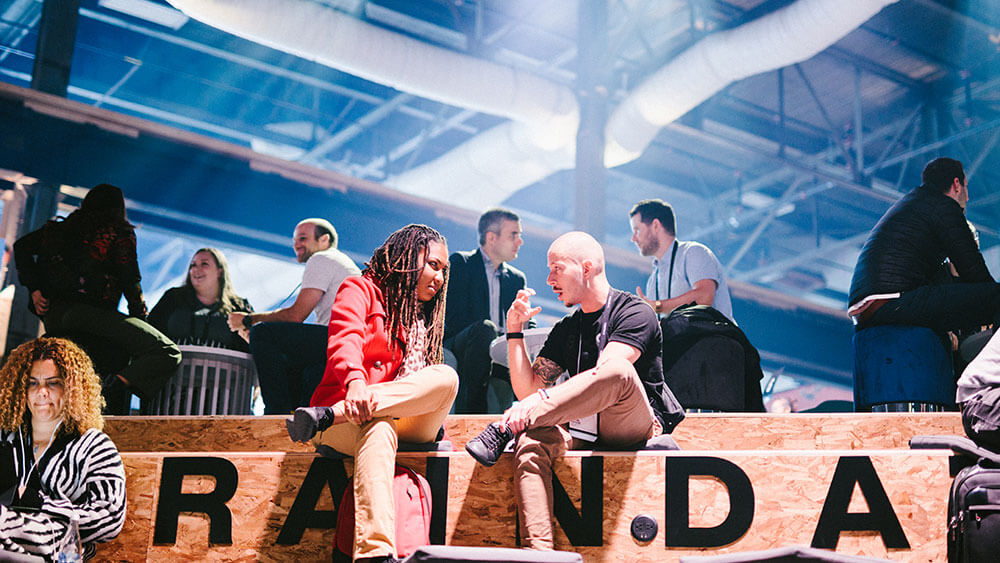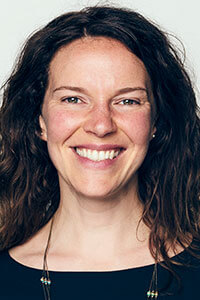
Participants at C2 Montreal 2019 carry on their Braindate sessions.
Christine Renaud is the CEO and co-founder of the Montreal-based company e180, creator of the peer-to-peer learning platform Braindate. A public speaker and author, Renaud earned a master’s degree in education from the Harvard Graduate School of Education and serves as an adviser to the Harvard Innovation Lab. She also has worked as a podcast producer for Learning Matters Educational Group in New York City. In this first of a series of columns by Renaud about what she has learned about collaborative and peer-to-peer learning, she shares how she came to realize that the best place for that to happen is at face-to-face events.

Christine Renaud
Okay, let’s do it.” My heart was pounding as I hung up the phone with the director of sales for C2 Montréal, a business conference that, in its first year, already had made a global splash. I looked at the clock: 4:45 p.m. on a Friday afternoon in February 2013. A few weeks earlier, C2’s organizers had told me they’d let me know if they were on board to prototype my company’s “braindates” platform at the second edition of the business conference, just a couple of months away. And now, we had a go. “Let’s bring braindates to C2.”
I had been working on this “braindate” thing for a while at that point — almost two years. Trained as a high-school teacher, I had learned from my short stint in a classroom that traditional schools weren’t keeping up with the pace of innovation in the real world. And too many teachers, tired and stretched too thin, saw students’ unique questions, challenges, interests, and personalities as annoyances, not a fertile ground for learning. That got me thinking: What is meaningful learning, and where does it take place? And how could we possibly support the different learning needs of the world’s 7 billion humans?
Over the next five years, I embarked on a quest to answer these questions. And what I discovered from observing people solving learning problems gave me a simple, yet powerful insight into how we learn.
We all know the feeling of facing a project that is too overwhelming to tackle alone, either because of our own lack of knowledge or experience, or both. It’s easy to feel stuck and lose confidence. So what do we do? Pursue a bachelor’s degree each time we need to learn something new? Definitely not. We often turn to someone we know who has what we lack. We pick someone’s brain. We talk to someone who has been there before. And once complex project of ours begins to look more manageable.
Which led me to this idea: What if, instead of the traditional teacher/ student model, we could become each other’s teachers, and propel one another forward by sharing our experiences, our successes, and our failures — and what we’ve learned along the way? What if we were to legitimize conversations with other humans as the valuable source of learning that it is?
‘For Knowledge, Not Love’
I began to envision a project that went beyond the walls of a traditional school and spilled out into the larger world. My company, e180, released Braindate in 2011 as the first social network dedicated to helping humans connect one-on-one with the purpose of sharing knowledge and learning from each other. Braindate used an online platform to match those who offered expertise with those in search of it, and arranged face-to-face conversations between them — it was like a date, but to find knowledge, not love.
People were enthusiastic about the concept, but in 2013, the number of people using the platform to complete braindates was low. None of us at e180 had any event experience, but what if, we wondered, we offered braindates at places where people already were gathered and were looking to meet knowledgeable strangers? Then came the call: “Let’s bring braindates to C2.”
I still remember when the first “knowledge offer” from a C2 attendee — who wanted to share their experience in particular area with another participant — appeared on the platform. Then came another one, and another, as braindate topics started to pour in by the hundreds. By the end of our first collaboration with C2, we had generated 1,200 braindates: more over the course of three days than we had in the previous 18 months of our existence as a public social network. We knew we were on to something. We soon came to realize that events have something unique, which we now refer to as the 5 Cs: they create the right context, where there’s a critical mass of people who share a common interest, who are captive, and committed to learning new things and meeting new, relevant people.
Another Braindate Story: Finding 1,000 Teachers at a 1,000-Person Event
In other words, when people attend events, they have already made the decision to use that time for networking and learning. And a platform like Braindate fulfills a real need: At most conferences, participants are left to their own devices, trying to hunt down the people they’d like to meet, with only a glass of wine for a compass. Maybe magic strikes, but maybe not. The odds are stacked against it. We realized that Braindate could help events empower their participants to be intentional about what they will learn and from whom.
Based on C2’s success and our new vision, we relaunched Braindate for event audiences, designed to foster collaborative learning during conferences around the world. Since 2013, we have served more than 350,000 event participants, generating thousands of braindates, working with 150 clients in Canada, the United States, Europe, the Middle East, and Australia, at some of the world’s most admired organizations, including TED, General Electric, the Skoll Forum, Salesforce, Airbnb, and PCMA’s Convening Leaders.
At e180, where our mission remains to unlock human greatness by helping people learn from each other, we’ve learned so much about so many topics: the future of learning, and what it (already) means for the events industry; the benefits of adding conversations to participants’ learning toolkit; and how to gather humans around learning for the most impact, for example. We’ve learned about the role of celebration, of gratitude and emotional safety in learning at an event, as well as the value of placemaking in fostering meaningful connections.
We have amazing stories to share. They are stories of growth and change, stories of success, and stories about how collaborative learning has deeply transformed people at events. If you spend some of your precious time reading our words, you may be a bit transformed, too.
What kinds of challenges do you face with implementing learning initiatives at your event? We’d love to hear from you, and we’ll share our thoughts in a future column: [email protected] or @christinerenaud on Twitter.
